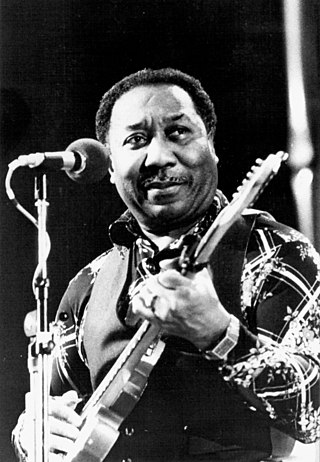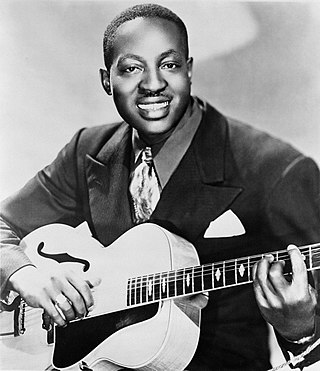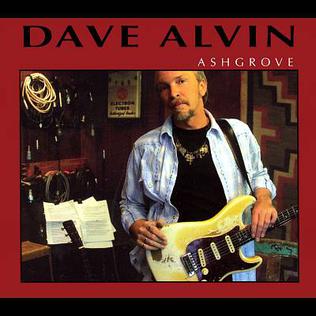
McKinley Morganfield, known professionally as Muddy Waters, was an American blues singer and musician who was an important figure in the post-World War II blues scene, and is often cited as the "father of modern Chicago blues". His style of playing has been described as "raining down Delta beatitude".

Joseph Vernon "Big Joe" Turner Jr. was an American blues shouter from Kansas City, Missouri. According to songwriter Doc Pomus, "Rock and roll would have never happened without him". Turner's greatest fame was due to his rock and roll recordings in the 1950s, particularly "Shake, Rattle and Roll", but his career as a performer endured from the 1920s into the 1980s.

Lizzie Douglas, better known as Memphis Minnie, was a blues guitarist, vocalist, and songwriter whose recording career lasted for over three decades. She recorded around 200 songs, some of the best known being "When the Levee Breaks", "Me and My Chauffeur Blues", "Bumble Bee" and "Nothing in Rambling".

Big Bill Broonzy was an American blues singer, songwriter, and guitarist. His career began in the 1920s, when he played country music to mostly African-American audiences. In the 1930s and 1940s, he navigated a change in style to a more urban blues sound popular with working-class black audiences. In the 1950s, a return to his traditional folk-blues roots made him one of the leading figures of the emerging American folk music revival and an international star. His long and varied career marks him as one of the key figures in the development of blues music in the 20th century.

David Albert Alvin is an American singer-songwriter, guitarist and producer. He is a former and founding member of the roots rock band the Blasters. Alvin has recorded and performed as a solo artist since the late 1980s and has been involved in various side projects and collaborations. He has had brief stints as a member of the bands X and the Knitters.

The Blasters are an American rock band formed in 1979 in Downey, California, by brothers Phil Alvin and Dave Alvin (guitar), with bass guitarist John Bazz and drummer Bill Bateman. Their self-described "American Music" is a blend of rockabilly, early rock and roll, punk rock, mountain music, and rhythm and blues and country.
Common Ground may refer to:

"Baby, Please Don't Go" is a traditional blues song that was popularized by Delta blues musician Big Joe Williams in 1935. Many cover versions followed, leading to its description as "one of the most played, arranged, and rearranged pieces in blues history" by French music historian Gérard Herzhaft.

Philip Joseph Alvin is an American singer and guitarist known primarily as the leader of the rock band The Blasters. His voice has been described as "robust...powerful...rich, resonant, [and] supremely confident."
"See See Rider", also known as "C.C. Rider", "See See Rider Blues" or "Easy Rider", is a popular American 12-bar blues song that became a standard in several genres. Gertrude "Ma" Rainey was the first to record it on October 16, 1924, at Paramount Records in New York. The song uses mostly traditional blues lyrics to tell the story of an unfaithful lover, commonly called an "easy rider": "See see rider, see what you have done", making a play on the word "see" and the sound of "easy".

The Blasters is the second album by American rock band the Blasters. Originally released in the United States by the independent label Slash Records, its strong sales performance required a deal for wider distribution with Warner Bros. Records. The album was well received, being ranked among the top 10 albums of 1982 by Time magazine and peaking at number 36 on Billboard's Pop Albums chart.

Willie Lee "Big Eyes" Smith was an American electric blues vocalist, harmonica player, and drummer. He was best known for several stints with the Muddy Waters band beginning in the early 1960s.

"Key to the Highway" is a blues standard that has been performed and recorded by several blues and other artists. Blues pianist Charlie Segar first recorded the song in 1940. Jazz Gillum and Big Bill Broonzy followed with recordings in 1940 and 1941, using an arrangement that has become the standard.

High Voltage is the debut studio album by Australian hard rock band AC/DC, released only in Australia and New Zealand, on 17 February 1975. Their first international release in 1976 would also be named High Voltage, though with a radically different track list.
"Marie Marie" is a song by American rock and roll band the Blasters. It became an international success after being covered by Welsh rock and roll singer Shakin' Stevens.

Eleven Eleven is the eleventh studio album by folk rock musician Dave Alvin. It was released on June 20, 2011 on Yep Roc Records, and an expanded reissue was released on April 17, 2012.

Ashgrove is an album by American artist Dave Alvin, released in 2004. It reached number 38 on the Top Independent Albums chart.

Public Domain is an album by American artist Dave Alvin, released in 2000.

Trouble in Mind is an album by American blues musician Big Bill Broonzy. It was released on February 22, 2000 by Smithsonian Folkways. The album consists of traditional folk, blues, and spiritual songs featuring Broonzy accompanying himself on acoustic guitar and a guest appearance by Pete Seeger. Suffering from cancer, Broonzy realized his time was limited and hence recorded extensively between 1956 and 1957. While most of the work draws from the album Big Bill Broonzy Sings Country Blues (1957), arranged by Moses Asch and Charles Edward Smith, Trouble in Mind is also sourced from concert broadcasts and interviews recorded late in Broonzy's career.

Muddy Waters Sings "Big Bill" is the first studio album, but second overall album by blues musician Muddy Waters, featuring songs by Big Bill Broonzy, released by the Chess label in 1960.

















